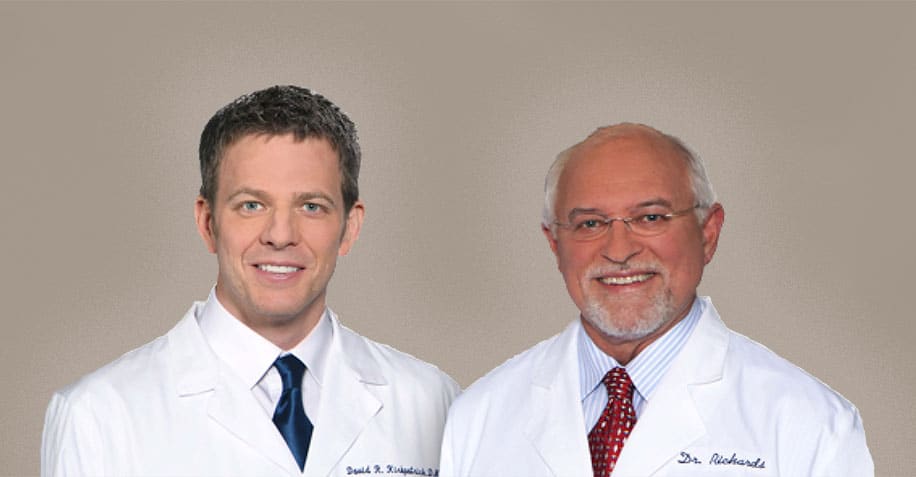What’s the difference between going to a general dentist or to an oral surgeon to have dental implants placed? While it may be more convenient and, at first, more inexpensive to receive implants from a dentist, an oral surgeon has years of education and experience at performing surgical procedures. A surgeon is also the only implant provider licensed to have general anesthesia administered in their facility. If a case becomes complex, which is especially common for dental implant procedures involving severe bone loss, then the dentist will eventually refer their patients into the care of an oral surgeon.
Why Education Matters
There is a big difference in the level of training required to be an oral surgeon, a periodontist and a general dentist. Across the gamut, the oral surgeon is the most qualified to perform complex dental implant procedures, as they have had the most education to prepare them for the procedure. Our oral surgeons have…
- Graduated from dental school
- Completed 4-6 years of training in residency
- Board-certified or board eligible status

To become an oral surgeon, the doctor must complete an additional four-to-six years of training after dental school. On the other hand, a general dentist can be certified to place dental implants at a weekend course. The latter represents the minimum requirement among dental implant providers.
The next level of expertise for oral surgeons is board certification. The American Board of Oral and Maxillofacial Surgery, or ABOMS, will certify a surgeon only after they’ve demonstrated their competence through a history of surgical cases and extensive oral and written exams. When a surgeon is board certified, it is truly a badge of confidence that proves to the patient that they are in capable hands.
If you are working with an oral surgeon who is not yet board certified, it is also appropriate to find out if they are board eligible. A board-eligible surgeon is on the path to becoming certified. Like their board-certified peers, they value positive patient outcomes, quality care and ongoing self-improvement.
Experience and Education Are Not the Same Thing
While education is an excellent assurance that you’re in good hands, nothing is a better indicator of quality than a history of very happy patients.
As previously mentioned, board certification includes proof of successful case history. In addition to that, you should research real patient feedback to learn how they feel after receiving service from their provider. In most cases, you can request to speak with a former patient.
Not every board-certified oral and maxillofacial surgeon will specialize in the same procedure. Some will not specialize in dental implants at all. The oral surgeons at New Teeth Now are specialized in a procedure that they have developed together over decades of real patient care.
Another great way to gauge an oral surgeon’s ability is to review their online testimonials. Do they position their patients first in their communication? While it is normal to have some negative reviews online, how does your surgeon respond to a negative review?
Will You Still Need Extractions?
Only an oral surgeon is licensed to have general anesthesia administered in their office. This offers a big advantage for patients who will need teeth extractions before their procedure.
Under the care of an oral surgeon, a patient who qualifies for New Teeth Now can have any remaining teeth extracted while they’re asleep under the supervision of an entire team of anesthetists. This is both a very safe approach to restoring the patient’s oral health, and a far more comfortable one from the patient’s perspective.
New Teeth Now does not charge additional fees for extractions, which means that having teeth removed beforehand is an unnecessary expense. It can also be an avoidable traumatic experience.
What Happens If Something Fails While Having Your Full Mouth Restored by a General Dentist?
Unfortunately, dental implant failure can happen. It is very rare at New Teeth Now. Unexpected complications are also likely to arise during or after a dental implant procedure. The oral surgeon is best equipped to help a patient recover from complications and failures, which is why at this point the patients will be referred to an oral surgeon by their general dentist. Patients who arrive in our office after going through this process will often lament, “Why did I not come to you first?”
Overview
In review, let’s look at a breakdown of how an oral surgeon compares to a general dentist.
ORAL SURGEON
- 4-6 additional years of training after dental school
- Specializes in dental implant placement
- Long-term proven success rate with implants
- Licensed to administer general anesthesia
- Ability to navigate all complications
- Wealth of knowledge and expertise
GENERAL DENTIST
- Can be certified after a weekend course
- Not the main service provided. Typically places a few implants a month.
- Not able to administer general anesthesia, and most aren’t certified to administer IV sedation
- Will refer to an oral surgeon for complicated cases
We strive for the highest level of quality in the industry. For that reason, a New Teeth Now oral surgeon must pass their oral and written board-certification exams, or be board eligible and working toward board certification.
Other Considerations When Choosing Your Implant Provider
Patients cite three priorities when researching dental implant providers. They are normally ranked in this order:
- Quality
- Cost
- Convenience
Quality is a consistent priority for patients who choose New Teeth Now. How much of your health and safety are you willing to sacrifice in exchange for a shorter drive or a bargain? When researching their options, patients can find it difficult to recognize quality.
You might assume higher fees are proof of better quality, for example. This is not always the case. Paying more for dental implants will not guarantee better quality surgical care, and vice versa. At New Teeth Now, we pride ourselves on offering the fairest possible price without sacrificing high standards of quality care.
Being transparent with our patients about what they can expect at every point in the New Teeth Now process is our testament to quality. Having only the best staff and surgeons working together for is how we inspire confidence in our patients.
How else can patients feel confident they won’t be sacrificing quality when choosing their implant provider?
Treat Your Consultation Like an Interview
While being a board-certified oral and maxillofacial surgeon is a reliable badge of quality, it is still important to get to know all of the people who will be involved in your procedure. What are their values and goals? How do they communicate with their patients, both past and present?

The perfect approach to vet a provider’s services is to ask great questions when you’re first getting to know each other.
After you make an appointment to discuss the procedure, get prepared for that in-person consultation. If you can, bring a list of questions that address your biggest concerns and dreams. What motivated you to schedule a consultation. We want to know!
The consult is an opportunity to learn about the procedure, and also to get a feel for the office and the professionals who will be there with you throughout the entire process.
At New Teeth Now, much of the consultation will be dedicated to giving the patient time with their oral surgeon. We’ve been told that not everyone prioritizes the patient-surgeon relationship in this way. We ask our patients a lot of questions at this point to make sure they qualify for the full mouth procedure. Our surgeons would prefer you salvage your natural teeth if that’s an option for you.
Need help preparing for your consultation. Here are several questions we’ve received from patients in the past:
- Are you an oral surgeon or a dentist?
- Will you be the oral surgeon providing my care?
- Are you a board-certified oral surgeon?
- How long have you been performing this procedure?
- What do your patients say about the quality of care in this facility?
- Can you put me in touch with a recent patient who can answer more of my questions about the procedure?
We welcome any and all questions as long as they’re relevant to the procedure. And this doesn’t stop after you’ve left the consultation. Sometimes people forget to ask things during that hour-long session, or they get distracted while learning something brand new from their surgeon.
We encourage you to stay in touch with us after you’ve left the office. You can email or call back with any questions. We are here to help.









